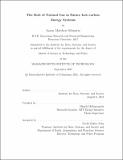The Role of Natural Gas in Future Low-carbon Energy Systems
Author(s)
Schwartz, Aaron Matthew
DownloadThesis PDF (3.782Mb)
Advisor
Mallapragada, Dharik
Terms of use
Metadata
Show full item recordAbstract
Concerns over climate change along with rapidly falling costs of clean energy technologies have led to increased scrutiny over the role of fossil-fuels in a low-carbon energy future. This thesis evaluates the role of natural gas-fired power plants (NG) in future electrical grids using an advanced, multi-period capacity expansion modeling framework with perfect foresight. We model cost-optimal grid operations, investments, and retirements through 2050 using a detailed representation of the American Southeast’s electrical grid which includes inter-region transmission, variable renewable energy resource characteristics, brownfield capacity, and lifetime and economic retirements. We examine several pathways to a highly decarbonized grid, assuming rapid growth in energy demand through mid-century. Sensitivities include CO2 emissions limits, technology costs, nuclear plant lifetime extensions, and NG deployment and financing schemes which aim to minimize stranded costs.
We find that investments in NG are made across all scenarios evaluated, as well as unprecedented deployments of variable renewable energy resources and battery storage. Results highlight the substantial emissions contributions of the existing coal fleet, and the potential for emissions reductions if lower-carbon generation resources, including new NG with and without carbon capture and storage, can replace this capacity. Furthermore, emissions limits which require the lowest mid-century CO2 emissions do not necessarily lead to the greatest cumulative emissions reductions over the planning horizon. These results support a nuanced approach to resource planning for future low-carbon grids which considers both short-term and long-term emissions reductions.
Date issued
2021-09Department
Technology and Policy ProgramPublisher
Massachusetts Institute of Technology